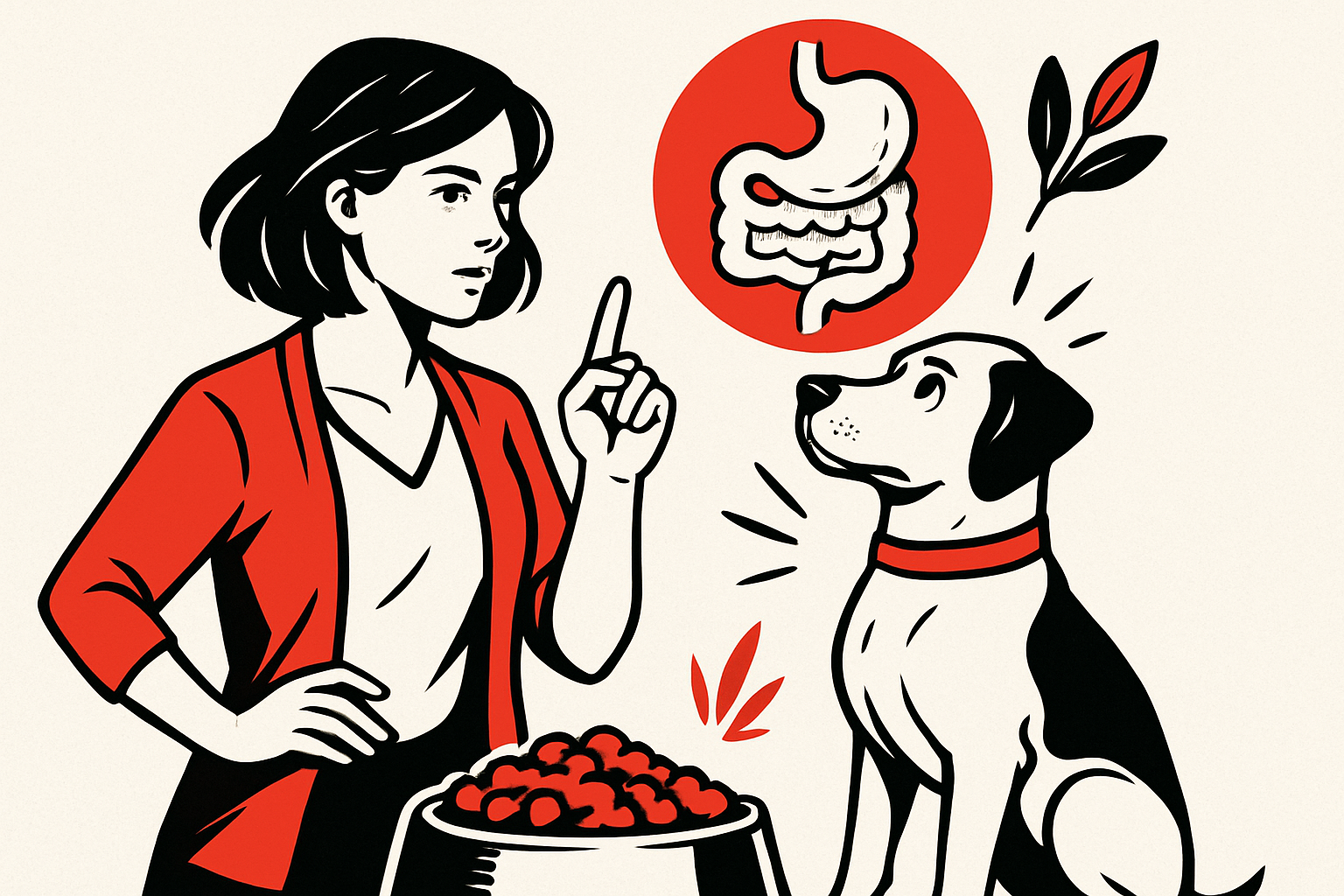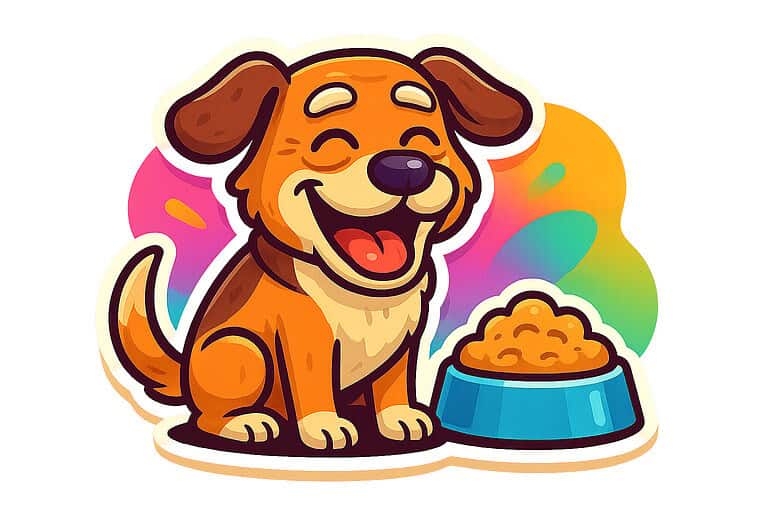12 Tips for a Healthy Digestion in Your Senior Dog

As your dog gets older, their digestion changes too. You might notice things aren’t running quite as smoothly as they used to. Especially now, it’s important to support your senior dog’s digestion as well as possible.
With a few simple tips, you can help your four-legged friend feel good and stay fit. After all, you want your senior dog to enjoy their leisurely walks and cuddle sessions without a care.
1) Feed easily digestible chicken or fish as a protein source
In their senior years, a dog’s stomach is often a bit more sensitive. Chicken and fish are gentle protein sources that won’t unnecessarily stress the stomach. They’re easy to prepare and most dogs tolerate them well.
If your dog tends to get tummy rumbles from other meats or their stool isn’t very firm, try cooked chicken or mild fish. Combined with a bit of rice or cooked carrots, it can work wonders—and it’s extra easy on digestion.
Seasonings and spicy sauces? Better skip them. The natural flavors are more than enough for your dog. Sometimes you just have to experiment a bit to see what agrees best with your own senior.
2) Give cooked rice as a bland diet for a sensitive stomach
Is your senior’s stomach acting up again? Cooked rice can really help. It’s easy to digest and gentle on your pup’s digestive tract.
Important: always cook rice without salt or spices. Dogs usually prefer it plain—no fine-dining vibes needed. Rice also helps firm up stool if your dog happens to have diarrhea.
If your dog isn’t used to rice, start with small portions. Not every dog is instantly excited—sometimes it takes a bit for them to warm up to it.
Many veterinarians recommend switching to a bland diet for a few days when there are stomach issues. So you’re not alone with this trick. If you want to learn more: the book Darmgesundheit beim Hund has additional info.
3) Pumpkin works wonderfully for constipation and stimulates digestion
If your senior dog is taking a long time to do their business, pumpkin can really help! Even small amounts of cooked pumpkin get the gut moving and often ease constipation very gently.
You don’t need pricey kabocha (Hokkaido)—any regular cooking pumpkin, like a sugar pumpkin, will do. Just peel it, cook it until soft, and mix small portions into their food. Most dogs really like it.
Pumpkin is packed with fiber and water. That supports digestion and makes everything a bit smoother. Give it a try—you’ll sometimes see improvement pretty quickly. No magic, just veggie power!
4) Kefir as a natural probiotic for a healthy gut flora
Kefir isn’t a miracle cure, but it can do your senior dog surprisingly much good. The natural probiotics support the good bacteria in the gut and help bring digestion back into balance.
Just mix a little kefir into their food—ideally start slowly so the gut can get used to it. Most dogs handle it well, but a quick “sniff test” beforehand can’t hurt.
Important: kefir should have no added sugar or artificial flavors. The simpler, the better! If you want to learn more about probiotics like kefir, take a look at this book on probiotics and prebiotics.
5) Psyllium husks as a fiber-rich addition to boost bowel activity
If your senior dog is a bit sluggish at times or the stool is backed up, psyllium husks might help. These little husks are true fiber powerhouses. They swell in the gut and get digestion moving.
Just sprinkle a little over their food. Start with a small amount and see how your dog reacts. Important: the husks always need enough water, or they won’t do their job. So make sure there’s always plenty of fresh water available!
Many dogs accept psyllium husks without a fuss, especially if you mix them into a favorite food. Kind of like adding oats to granola—only for dogs.
6) Do a gut-supporting regimen twice a year
Older dogs can be a bit more sensitive when everyday routines change. A regular gut-support regimen can help maintain balance in the belly.
It’s recommended to plan a course with Darm Dyn and salmon oil twice a year. Darm Dyn provides important nutrients for the gut flora, while salmon oil contributes omega-3 fatty acids that gently support the gut.
It’s simple to use: just follow the dosage on the package—or, if you’re unsure, ask your veterinarian. My tip: mix salmon oil into the food; it usually gets happily slurped!
With this regimen, you can do something naturally good for your dog. It helps keep their tummy fit—and they’ll simply feel better.
7) Ensure plenty of fresh water
Sounds simple, but it’s truly essential: fresh water should never be missing for your senior dog. Without enough fluids, digestion just doesn’t run smoothly.
Your dog needs water to properly process their food and absorb the nutrients they need.
Always keep a bowl of clean water available—really, always. Older dogs do sometimes forget to drink, almost like it’s not on their radar anymore.
A small trick: place the bowl somewhere it’s impossible to miss. Sometimes that’s enough to encourage a few extra sips.
Change the water regularly, or germs will build up quickly. Older dogs are often more sensitive to that than the youngsters.
If you’re worried your dog isn’t drinking enough, take a look at their drinking habits. Dogs that drink well are usually fitter and simply seem more content. You can find even more helpful tips in specialized guides, including those focused on caring for older dogs.
8) Avoid high-fat and hard-to-digest food as they age
Especially in the senior years, high-fat food can really be tough on your dog. A bowl full of fatty food may be filling, but digestion often can’t keep up like it used to. As dogs age, the gut simply works more slowly—and sometimes you notice that more than you’d like.
Hard-to-digest ingredients? Those are counterproductive now. Digestion has to work harder, which can lead to gas, discomfort, or even diarrhea. What a young dog can shrug off may be too much of a good thing for senior pups.
Opt for easy-to-digest foods formulated especially for seniors. Nutrition expert Timea Szabo also recommends cutting out fatty and hard-to-digest components. Your dog will likely thank you with a better mood and more energy!
9) More exercise promotes bowel activity and overall health
Have you noticed how much better your senior’s digestion is when they move more? A bit of activity—whether relaxed walks or short play sessions—stimulates the gut, almost like a little massage from the inside.
Many older dogs get comfier—it’s understandable. But with a little motivation, it often works out. Several short walks a day instead of just one long one can make a big difference.
And let’s be honest: who doesn’t enjoy a bit of variety and the occasional sniff break?
Beyond digestion, your dog’s overall health benefits from more movement. Muscles stay stronger, mobility improves, and even their mood seems to lift—at least that’s what many experts say, for example in Ratgeber Altern. Sounds plausible, right?
10) Soft veggies like carrots or zucchini are good for digestion
Want to do something nice for your senior dog? Soft vegetables like carrots or zucchini are a great choice. These varieties are easy to digest and gentle on the stomach.
Carrots are often recommended because they provide fiber and support the gut. Zucchini are mild and easy to mash—handy if your dog isn’t much of a power chewer anymore.
It’s best to cook or steam the veggies first; that makes them even easier to digest. Some dogs even love them as a little snack between meals. Give it a try.
If your pup has never had vegetables, start slowly and offer only small amounts. Every dog is different—kind of like how we feel after a big Sunday roast. You’ll find more tips and recipes in this book on healthy dog nutrition.
11) Apple cider vinegar in small amounts can support the gut flora
You may have heard that apple cider vinegar has plenty of benefits for people. In small amounts, it can be good for your senior dog too. Apple cider vinegar contains natural acids that can support a healthy gut flora.
The key is not to overdo it. A few drops over the food are enough. That gives your dog a small extra boost without upsetting a sensitive stomach.
Start with a tiny amount and see how your dog reacts. Every dog is different—some wrinkle their noses, others find the slightly tangy smell intriguing.
Don’t stress if it doesn’t work right away. Sometimes it just takes a while for your pup to get used to new flavors. It’s the same with us, isn’t it?
12) Choose quality fats, like from salmon oil, for gut health
Good fats are really important for digestion and your senior dog’s well-being. Salmon oil is a bit of a secret tip. It provides omega-3 fatty acids that support the gut and—as a nice bonus—often help keep the coat shiny.
Salmon oil is easy to mix into food. Most dogs love it. But quality matters, and less is sometimes truly more when it comes to dosage. Too much fat can cause problems again.
It’s best to follow the directions on the label. That way your dog stays fit and perky—without any digestive drama.
Why digestion is so special in senior dogs
As your dog ages, plenty of things change—and the gastrointestinal tract is no exception. Digestive issues pop up more often in older dogs than we’d like. Suddenly your pup doesn’t shrug things off like they used to, and that can affect their mood too.
How aging affects the gastrointestinal tract
As your dog gets older, digestion simply slows down. The muscles in the digestive tract weaken, food stays in the body longer—and you notice it.
Digestive juices also decrease. Fatty or hard-to-digest foods are more likely to sit in the gut or cause gas. On top of that, fewer enzymes are produced—those little helpers that turn food into energy.
Many senior dogs lose a bit of their appetite. Maybe you’ve seen it: what used to be inhaled is now just briefly sniffed. That, of course, shows up in their digestion.
Typical challenges in older four-legged friends
Constipation is a recurring topic with older dogs. They move less, the gut gets more sluggish, and arthritis often plays a role too—every walk can feel twice as tiring. Their circulation doesn’t kick into gear as easily either.
Many seniors on four paws suddenly develop diarrhea at some point. That’s usually because the intestinal lining isn’t as robust as it once was. It absorbs less water, and everything rushes through a bit too quickly.
Intolerances and allergies? Unfortunately, those show up more often in older dogs too. Food that was fine for years can suddenly be a problem. Maybe your dog scratches more, or the coat looks dull—little things like that start to stand out.
Here’s a quick overview of the most common digestive issues in senior dogs:
| Issue | Possible cause |
|---|---|
| Constipation | Low activity, muscle weakness |
| Diarrhea | Decreased absorption in the gut |
| Gas/bloating | Weaker digestive enzymes |
| Food intolerances | Aging gut flora |
Practical support for everyday life
In day-to-day life, senior dogs sometimes just need a little extra attention. With a few small adjustments, you can do a lot for your pup’s well-being.
Low-stress routines around walks
Let’s be honest: who likes to rush out the door right after waking up? Older dogs find hectic routines just as exhausting. Especially for digestion, it’s golden when walks happen around the same time and in a relaxed way.
Choose quiet routes, away from the hustle and bustle of the city or lots of other dogs. A set daily rhythm gives your dog a sense of security. Walks can be shorter—just go out more often. That keeps the GI tract relaxed, and your dog won’t feel stressed when it’s time to relieve themselves.
Some senior dogs are quite sensitive to noise and commotion outside. Treat yourselves to a gentle start to the day—maybe a calm loop with a few pauses to sniff or watch the world go by.
That’s not only good for digestion; it also lifts the mood—and honestly, who wouldn’t want that?






